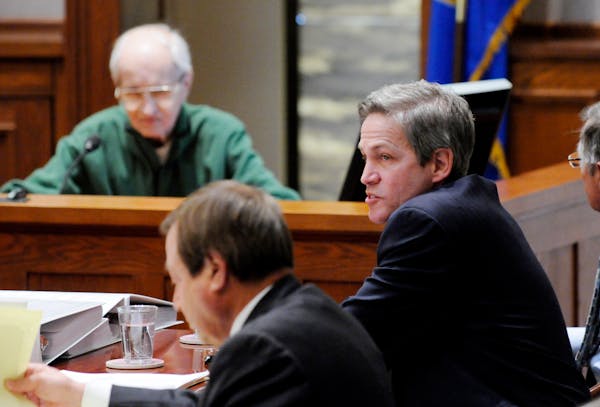After he lost the unofficial lead in Minnesota's U.S. Senate recount, Republican Norm Coleman called for an exhaustive review of rejected absentee ballots to see whether they should be counted. But a state elections official testified Wednesday that Coleman pursued a different strategy when he was leading.
Deputy Secretary of State Jim Gelbmann said that in December the Coleman camp wouldn't accept 1,346 absentee ballots that county elections officials said were wrongly rejected. Gelbmann testified that even when he said there was "little doubt" that 93 of the ballots were valid, Coleman's lawyers said "they needed time to look over the list."
The testimony came on the third day of trial in Coleman's election lawsuit as lawyers for Democrat Al Franken sought to blunt Coleman's recent position that he is championing the counting of all valid votes while Franken is fighting to prevent it.
Coleman's suit is challenging the recount, which showed Franken with a 225-vote lead.
Before Wednesday's testimony, the three-judge panel hearing the suit denied Coleman's motion to prevent Franken's lawyers from detailing the Republican's earlier resistance to admitting improperly rejected absentee ballots.
Coleman attorney Ben Ginsberg downplayed his legal team's evolving position and said both sides had made notable shifts that were largely now unimportant. "[What's] important now are the ballots themselves, and were they rightly or wrongly rejected," he said. "Whether in the course of the recount proceedings we were arguing one thing, the Franken folks were arguing something else, is not relevant."
Ginsberg said the campaign's earlier arguments were made during a more limited administrative recount overseen by the state Canvassing Board, and "this contest, before these judges, is a new proceeding."
Coleman argument
The Coleman campaign also relied on Gelbmann's testimony to support a different argument: that inconsistent practices by local officials meant some valid absentee ballots remain uncounted.
Gelbmann said that tallies could vary depending on how successful officials were in finding registration cards filed with absentee ballot envelopes. And some local elections judges counted ballots when signatures on their envelopes were "close enough" to those on applications. Others seemed to have a stricter standard, although Gelbmann said they were instructed by the state "to err on the side of accepting the vote." Still other ballots were rejected, he said, because elections judges couldn't find a voter's hyphenated last name on rosters.
In questioning Gelbmann, Coleman lawyer Joe Friedberg tried to establish that some elections officials took "a very restrictive view" of which ballots to accept.
Gelbmann discussed how Washington County rejected absentee ballots involving college students from Minnesota who listed their college dormitory address during the voting process. When county officials asked the secretary of state's office what it should do with 34 such ballots, they were told to use their discretion. While the county thought the ballots were probably valid, they ended up rejecting them because they didn't have time to verify the information.
'Lucinda' vs. 'Cindy'
In the case of another ballot, Friedberg noted that the problem was that an application witness whose first name was "Lucinda" signed it as "Cindy."
"There wasn't any doubt in your mind [it should be counted]?" Friedberg asked.
"That is correct," said Gelbmann.
"Would you be surprised to know that it hasn't been [counted]?" Friedberg said.
Gelbmann said the vote was not counted because one -- or both -- of the campaigns likely objected to it. The Minnesota Supreme Court allowed the campaigns to essentially block rejected absentee ballots from being counted even though election officials believed they may have been erroneously set aside.
"It was something that I had no control over," Gelbmann said. "It was an order by the Supreme Court."
In response to questions from Franken lawyer David Lillehaug, Gelbmann said he was campaign manager for former Democratic Sen. Mark Dayton. Outside court, he said that he had voted for the Independence Party's Dean Barkley in the 2008 Senate election.
In an interview last week with the South Washington [Minn.] County Bulletin, a local newspaper where Gelbmann lives, he said his role in the recount "was like playing referee in a sandbox."
"I was disgusted with the campaigns by both candidates," he told the newspaper. "I couldn't stomach the negative ads, which were way out for Minnesota standards."
Franken side's tack
Lillehaug spent much of the day suggesting that Coleman's push to cast a wider net for ballots was at odds with the campaign's practice when it held the lead. Lillehaug said a Coleman legal brief from mid-November stated that "absent any evidence to the contrary, the decisions of local election officials should be presumed to have been accurate and correct." Lillehaug elicited from Gelbmann that Coleman didn't press for reconsideration of as many as 11,000 rejected absentee ballots until after the Canvassing Board certified Franken.
Also Wednesday, in preparing for a hearing before the state Supreme Court, the Franken campaign filed papers arguing that he should be given an election certificate -- opening the way for him to be seated in the Senate -- while the court challenge takes place. The Supreme Court is to hear arguments next Thursday.
Finding an apartment may be easier for California pet owners under new legislation
AP Decision Notes: What to expect in Pennsylvania's presidential and state primaries

